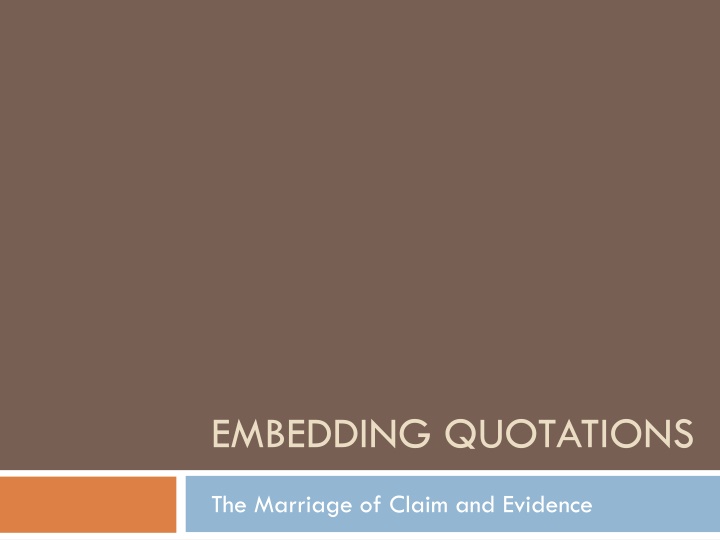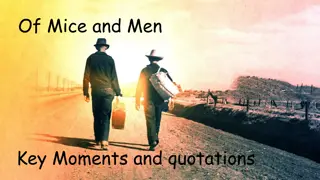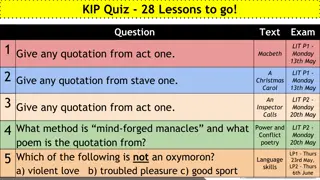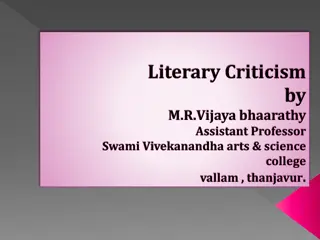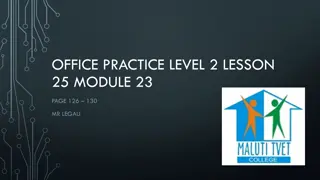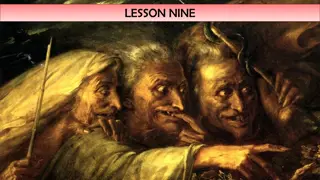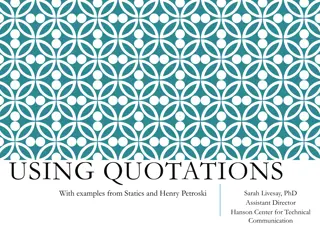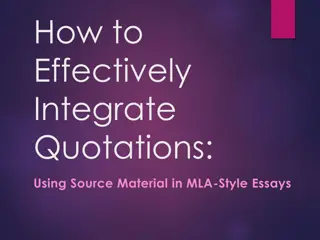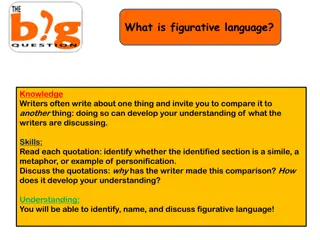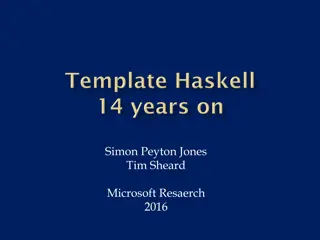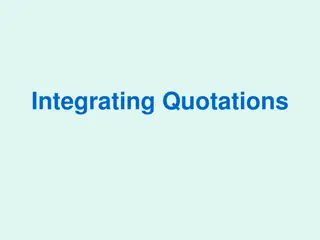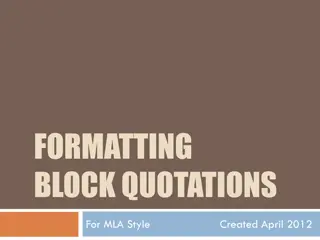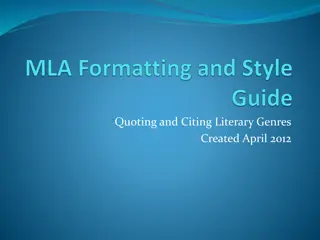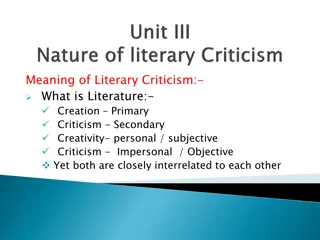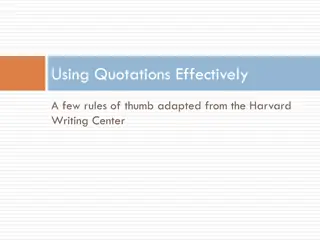Mastering Quotations in Literary Analysis
Essays in the Literary Tradition sequence often require interpretive analysis arguments, built from articulate and defendable claims. This presentation by Dr. Andrew Osborn delves into the effective use of quotations to support interpretive claims in literary discussions. Learn how to incorporate embedded quotations to strengthen arguments and enhance the understanding of literary texts.
Download Presentation

Please find below an Image/Link to download the presentation.
The content on the website is provided AS IS for your information and personal use only. It may not be sold, licensed, or shared on other websites without obtaining consent from the author.If you encounter any issues during the download, it is possible that the publisher has removed the file from their server.
You are allowed to download the files provided on this website for personal or commercial use, subject to the condition that they are used lawfully. All files are the property of their respective owners.
The content on the website is provided AS IS for your information and personal use only. It may not be sold, licensed, or shared on other websites without obtaining consent from the author.
E N D
Presentation Transcript
EMBEDDING QUOTATIONS The Marriage of Claim and Evidence
EMBEDDING QUOTATIONS by Dr. Andrew Osborn
Introduction Most of the essays that you write for courses in the Literary Tradition sequence will be arguments based on interpretive analysis.
Introduction Most of the essays that you write for courses in the Literary Tradition sequence will be arguments based on interpretive analysis. Arguments are built from claims, which must be articulated and defended.
Introduction Most of the essays that you write for courses in the Literary Tradition sequence will be arguments based on interpretive analysis. Arguments are built from claims, which must be articulated and defended. In arguments about literature, the claims most often will be interpretive; that is, they will regard how certain language should be understood.
Introduction You may defend claims about your understanding of a text an epic, for example, or a lyric poem, tragic drama, or prose narrative by showing that its language signifies what you say it does.
Introduction You may defend claims about your understanding of a text an epic, for example, or a lyric poem, tragic drama, or prose narrative by showing that its language signifies what you say it does. The engines of a literary argument are claim-making interpretive sentences that supply their own evidence, often in the form of embedded quotations.
Introduction This presentation will review how to think about using quotations in arguments about the interpretation of literature.
Introduction This presentation will review how to think about using quotations in arguments about the interpretation of literature. Although the directive key points should be helpful, the positive and negative interpretive sentences which exemplify what you should strive to emulate or avoid may be more helpful.
Introduction An audio recording of Dr. Osborn presenting an earlier version of this PowerPoint is available here. (You may listen to it in the background as you continue watching the presentation.)
Key Points Quotations should serve primarily as evidence for interpretive claims.
Key Points Quotations should serve primarily as evidence for interpretive claims. Quotations generally should be kept short.
Key Points Quotations should serve primarily as evidence for interpretive claims. Quotations generally should be kept short. Quotations should be situated such that the scene and speaker are identified.
Key Points Quotations should serve primarily as evidence for interpretive claims. Quotations generally should be kept short. Quotations should be situated such that the scene and speaker are identified. Quotations should not be isolated; instead they should be embedded grammatically within claim- making sentences.
Interpretive Sentences What follows is a series of claim-making, interpretive sentences some exemplary, some negative and explanations of what makes them good or bad.
Interpretive Sentences What follows is a series of claim-making, interpretive sentences some exemplary, some negative with explanations of what makes them good or bad. Although you ll encounter quotations from Shakespeare and Dante, most are from Homer s Odyssey.
Interpretive Sentences Example 1 In The Odyssey s opening lines, Homer likens the telling of a tale to the sailing of a ship when he invokes the muse to Launch out on [the] story (1.11).* Given that Odysseus is the man of twists and turns and that he is driven time and again off course, it should come as no surprise that the story shifts back and forth in time and is full of digressions (1.1, 2). *Fagles translation
Interpretive Sentences Example 2 When the hero Tithonos became Dawn s consort, he was granted immortality but not eternal youth and so dwindled over the years to little more than a pulsing ember. Book Five of The Odyssey begins with the epic s only mention of him Now Dawn rose from her bed, where she lay by haughty Tithonos as apt context for Odysseus s escape from the nymph Kalypso, who had hopes [to] make him immortal and all his days to be endless but might also have neglected to secure her lover s vim (Od. 5.1, 136). Book Five s conclusion hints again at Odysseus s avoidance of Tithonos s tragic fate when, bedding down near the shore of Scheria, Odysseus burie[s] himself in the leaves as one buries a burning log in a black ash heap . . . and saves the seed of fire (5.488-91).
Interpretive Sentences Example 3 When the hero Tithonos became Dawn s consort, he was granted immortality but not eternal youth and so dwindled over the years to little more than a pulsing ember. Book Five of The Odyssey begins with the epic s only mention of him Now Dawn rose from her bed, where she lay by haughty Tithonos as apt context for Odysseus s escape from the nymph Kalypso, who had hopes [to] make him immortal and all his days to be endless but might also have neglected to secure her lover s vim (Od. 5.1, 136). Book Five s conclusion hints again at Odysseus s avoidance of Tithonos s tragic fate when, bedding down near the shore of Scheria, Odysseus burie[s] himself in the leaves as one buries a burning log in a black ash heap . . . and saves the seed of fire (5.488-91).
Point 1 Quotations should serve primarily as evidence for interpretive claims.
Point 1 Quotations should serve primarily as evidence for interpretive claims. To think of quotations as evidence is to recognize that they should be used to secure otherwise vulnerable (controversial) claims
Point 1 Quotations should serve primarily as evidence for interpretive claims. To think of quotations as evidence is to recognize that they should be used to secure otherwise vulnerable (controversial) claims So: minimize the use of quotation to provide mere information about which there can be little or no disagreement
Negative Example A Odysseus shows both emotional and physical restraint when, after escaping an inglorious death at sea and stumbling upon the young girls with well-ordered hair on the shore of Scheria, he encounters the only daughter of Alkino s (6.135, 139).
Negative Example A Odysseus shows both emotional and physical restraint when, after escaping an inglorious death at sea and stumbling upon the young girls with well-ordered hair on the shore of Scheria, he encounters the only daughter of Alkino s (6.135, 139). [The underlined assertion is a claim that deserves support, but the quotations do not offer relevant evidence.]
Point 2 Quotations generally should be kept short.
Negative Example B In The Odyssey s opening lines, Homer implicitly likens the telling of a tale to the sailing of a ship: Launch out on his story, Muse, daughter of Zeus, / start from where you will sing for our time too (1.11-12).
Negative Example B In The Odyssey s opening lines, Homer implicitly likens the telling of a tale to the sailing of a ship: Launch out on his story, Muse, daughter of Zeus, / start from where you will sing for our time too (1.11-12).
Example B - improved In The Odyssey s opening lines, Homer implicitly likens the telling of a tale to the sailing of a ship when he invokes the muse to Launch out on [the] story (1.11).
Example B - improved In The Odyssey s opening lines, Homer implicitly likens the telling of a tale to the sailing of a ship when he invokes the muse to Launch out on [the] story (1.11).
Point 2 Quotations generally should be kept short. Using brief quotations is the most reliable way to indicate what particular language secures your claim.
Point 3 Quotations should be situated such that the scene and speaker are identified.
Negative Example C Odysseus lets his ego get the best of him, and out of stupidity tells the Cyclops what his real name is as he is leaving. Little did he know that Polyphemos was a son of Poseidon. Hear me, Poseidon who circle the earth, dark-haired. If truly / I am your son, and you acknowledge yourself as my father, / grant that Odysseus, sacker of cities, son of Laertes, / who makes his home in Ithaka, may never reach home (9.528-31).
Negative Example C Odysseus lets his ego get the best of him, and out of stupidity tells the Cyclops what his real name is as he is leaving. Little did he know that Polyphemos was a son of Poseidon. Hear me, Poseidon who circle the earth, dark-haired. If truly / I am your son, and you acknowledge yourself as my father, / grant that Odysseus, sacker of cities, son of Laertes, / who makes his home in Ithaka, may never reach home (9.528-31).
Negative Example C Odysseus lets his ego get the best of him, and out of stupidity tells the Cyclops what his real name is as he is leaving. Little did he know that Polyphemos was a son of Poseidon. Hear me, Poseidon who circle the earth, dark-haired. If truly / I am your son, and you acknowledge yourself as my father, / grant that Odysseus, sacker of cities, son of Laertes, / who makes his home in Ithaka, may never reach home (9.528-31).
Negative Example C Odysseus lets his ego get the best of him, and out of stupidity tells the Cyclops what his real name is as he is leaving. Little did he know that Polyphemos was a son of Poseidon. Hear me, Poseidon who circle the earth, dark-haired. If truly / I am your son, and you acknowledge yourself as my father, / grant that Odysseus, sacker of cities, son of Laertes, / who makes his home in Ithaka, may never reach home (9.528-31).
Point 3 Quotations should be situated such that the scene and speaker are identified. Many quotations are hard or impossible to interpret without a sense of their context. Nothing, my lord from King Lear s virtuous Cordelia in scene 1 registers differently from Nothing, my lord as spoken by the ambitiously treacherous Edmund in scene 2.
Point 3 Quotations should be situated such that the scene and speaker are identified. Many quotations are hard or impossible to interpret without a sense of their context. Nothing, my lord from King Lear s virtuous Cordelia in scene 1 registers differently from Nothing, my lord as spoken by the ambitiously treacherous Edmund in scene 2. Dante s Virgil can urge the pilgrim to let pleasure be your guide only at the threshold of Earthly Paradise (Purg. 27.131). Had he said this earlier say, in Hell disaster might have ensued.
Point 3 Quotations should be situated such that the scene and speaker are identified. Many quotations are hard or impossible to interpret without a sense of their context. Nothing, my lord from King Lear s virtuous Cordelia in scene 1 registers differently from Nothing, my lord as spoken by the ambitiously treacherous Edmund in scene 2. Dante s Virgil can urge the pilgrim to let pleasure be your guide only at the threshold of Earthly Paradise (Purg. 27.131). Had he said this earlier say, in Hell disaster might have ensued. For guidance on how to understand a given statement, we often need to know by whom and under what circumstances the statement has been made.
Negative Example C Odysseus lets his ego get the best of him, and out of stupidity tells the Cyclops what his real name is as he is leaving. Little did he know that Polyphemos was a son of Poseidon. Hear me, Poseidon who circle the earth, dark-haired. If truly / I am your son, and you acknowledge yourself as my father, / grant that Odysseus, sacker of cities, son of Laertes, / who makes his home in Ithaka, may never reach home (9.528-31).
Point 4 The Big One Quotations should not be isolated; instead they should be embedded grammatically within claim- making sentences.
Point 4 The Big One Quotations should not be isolated; instead they should be embedded grammatically within claim- making sentences. So: the unquoted prose of the interpretive sentence articulates the claim and situates one or more brief quotations.
Point 4 The Big One Quotations should not be isolated; instead they should be embedded grammatically within claim- making sentences. So: the unquoted prose of the interpretive sentence articulates the claim and situates one or more brief quotations. And: these brief quotations provide the textual evidence that supports the claim (and little or nothing more).
Point 4 The Big One Quotations should not be isolated; instead they should be embedded grammatically within claim- making sentences. So: the unquoted prose of the interpretive sentence articulates the claim and situates one or more brief quotations. And: these brief quotations provide the textual evidence that supports the claim. The two complement each other like well-matched spouses.
Point 4 The Big One Quotations should not be isolated; instead they should be embedded grammatically within claim- making sentences. So: the unquoted prose of the interpretive sentence articulates the claim and situates one or more brief quotations. And: these brief quotations direct attention to the textual evidence that supports the claim. The two complement each other like well-matched spouses. The sentence s grammar plays the role of matrimony.
Point 4 implies Points 1, 2, and 3 Quotations should not be isolated; instead they should be embedded grammatically within claim- making sentences. Quotations should serve primarily as evidence for interpretive claims. Quotations generally should be kept short. Quotations should be situated such that the scene and speaker are identified.
Negative Example D Penelope turns upon Odysseus the kind of trick he has used upon others when she orders the bed he had built to be moved. Put the firm bed here outside for him, and cover it / over with fleeces and blankets, and with shining coverlets (23.179-80).
Example D very minor improvement Penelope turns upon Odysseus the kind of trick he has used upon others when she orders the bed he had built to be moved: Put the firm bed here outside for him, and cover it / over with fleeces and blankets, and with shining coverlets (23.179-80). [Integrate the evidential quotation into the claim- making sentence.]
Example D further improved Penelope turns upon Odysseus the kind of trick he has used upon others when she orders the bed he had built to be moved: Put the firm bed here outside for him, and cover it / over with fleeces and blankets, and with shining coverlets (23.179-80). [These details are irrelevant to the argument.]
Example D further improved Penelope turns upon Odysseus the kind of trick he has used upon others when she orders the bed he had built to be moved: Put the firm bed here outside for him (23.179). [But the quotation remains somewhat isolated.]
Example D final version Penelope turns upon Odysseus the kind of trick he has used upon others when she orders their firm bed to be moved here outside for him (23.179). [That s better!]
